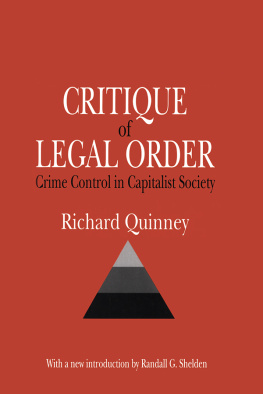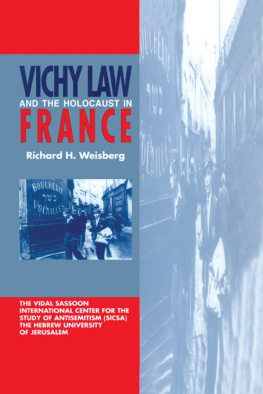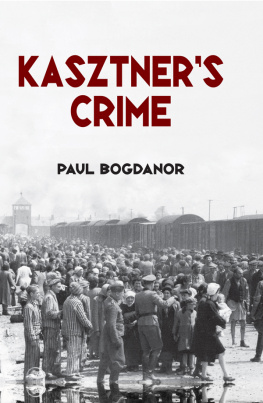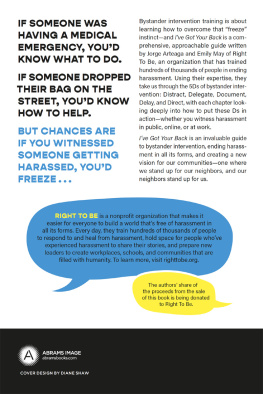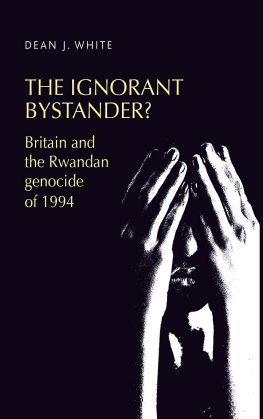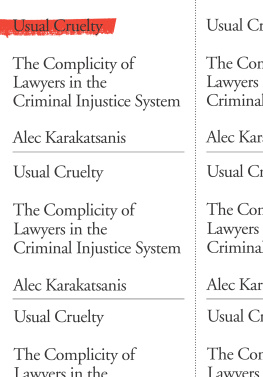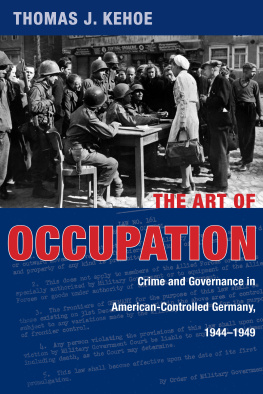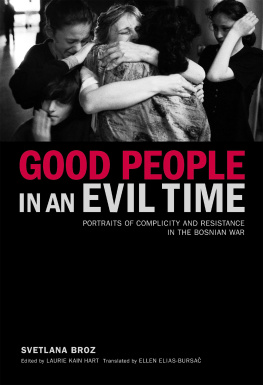Praise for The Crime of Complicity
Join Amos Guiora on his personal journey back to the Holocaust to understand the complicity of bystanders who watched his father on a death march in Serbia, his mother and grandmother being lined up to be executed in Budapest, and his grandparents waiting on a platform for the train that would take them to their deaths at Auschwitz. Guiora asks whether such bystanders had a legal duty to intervene and, if so, what actions were they required to take. This book will force you to ask yourself a lot of difficult questions about what you would do as such a bystander and whether you would have the courage to act.
Daniel C. Barr, Perkins Coie LLP, Phoenix, Arizona
As the only son of Viennese Jewish Holocaust refugees, I find a book on this subjectespecially by a distinguished law professorto be inherently interesting. What I discovered further in reading through the fascinating text is that this particular book is also quickly galvanizing and impressively original. In a field that has already been examined endlessly by scholars and others, Guioras book remains both imaginative and important. Should bystanders be regarded as complicit for pertinent forms of nonintervention? How shall we best explain the bystanders (all-too-common) decision not to intervene? These are plainly difficult questions to answer; yet the author offers an assessment that is uniformly competent and thoroughly purposeful and that builds a compelling jurisprudential argument for treating various forms of bystander complicity as a distinctly punishable crime. I am delighted to celebrate this brilliant book with great intellectual enthusiasm.
Louis Ren Beres, professor emeritus
of international law,
Purdue University
Amos Guioras The Crime of Complicity should make any bystander who sees violence against another and chooses to do nothing about it shudder. He recounts in depth the suffering of his family in death marches and concentration camp agony, watched by Eastern Europeans who looked the other way, to campus rape watchers who did nothing. Ripe for debate, Guiora argues that those who watch violence have a greater duty not to remain silent, and that legislation imposing that duty to protect the innocent might be necessary. Guiora is masterful in personalizing the pain with academic vicarious liability theory.
Avery Friedman, CNN legal analyst
Amos Guiora has written an important book. Rooted in family history scarred by Nazi persecution and through his personal journey to understand the whys of the past, this book contends that bystanders inaction was the essence of the Holocaust. With this insight, he carefully builds a case that moral obligation alone cannot secure justice. Rather, in history and in our contemporary world, bystanders must be judged for their complicity and held accountable by the state for refusing to protect the innocent from harm. This is a necessary addition to the literature on collective responsibility and guilt.
Robert A. Goldberg, professor of history,
University of Utah
In asking simple questions, Amos Guiora elaborates the knowledge and conduct of the individual bystander during the Holocaust. He explains the role of the bystander in relation to the perpetrator and victim in such a way that the reader with no profound knowledge about the Holocaust is able to understand the issue. He has written an impressive, very accessible book for the general public that shows how the decision of the bystander to not intervene in the face of situations of imminent harm accentuates the victims vulnerability with disastrous consequences.
Fred Grnfeld, professor emeritus of
international relations and human rights,
Maastricht University and Utrecht University
The Crime of Complicity is a multi-layered work. It combines personal memoir, historical research, legal opinion, and a moral ethical challenge. In this time of renewed hate speech, intolerance, bullying, and profiling, Amos Guioras book is a hard read, but it brings us face-to-face with an issue we cannot ignore except at our peril.
Rev. Dr. John C. Lentz, Jr., senior pastor,
Forest Hill Church, Presbyterian,
Cleveland and author of Lukes Portrait of Paul
AMOS N. GUIORA
THE CRIME OF COMPLICITY
THE BYSTANDER IN THE HOLOCAUST

Dedication
On October 28, 2015, my father, Professor Alexander Z. Guiora, passed away in Jerusalem.
In honor of his 90th birthday (June 13, 2015), my mother and I published a book of his writings with commentary by friends who graciously agreed to contribute to that effort.
For me, there is a direct link between that book and the present volume: Both address issues related to the Holocaust, the human condition, and individual responsibility or accountability.
It would be a gross exaggeration to suggest my writings build on my fathers; however, it is correct to say that my father profoundly influenced me.
If there is a word more powerful than profound, that would be applicable.
In late May 1944, my paternal grandfather, Salamon Goldberg, was murdered in Auschwitz.
He stood in the selection line surrounded by other Jews, but minutes from the gas chambers. There is no way to know his final thoughts. I do not know whether he understood what horrific fate awaited him.
What I do know is that his brave decision to have my father study in Budapestthereby defying the wishes of his father-in-law, an important Satmar Rabbi in eastern Hungaryspared my father from deportation to Auschwitz.
Although I never met my grandfather, much less have never seen his picture, I owe him my life.
While visiting my grandparents hometown, Nyregyhza, I said the Mourners Kaddish. I felt, simultaneously, overwhelming sadness and profound gratitude. It is difficult to understand the courage required to make the decision he made.
For that reason, my grandfather is truly a hero.
Contents
Preface
Over the past 12 years I have written a number of books and articles. Most, not all, have focused on questions and dilemmas regarding national security. On occasion, I have stepped outside my comfort zone, addressing additional issues. Often, I draw on my professional experiences largely based on my 19-year career in the Israel Defense Forces.
This book has been a profoundly different experience. Unlike previous writing efforts, this book has become deeply personal, forcing me to examinein an intimate mannerthe impact the Holocaust has had on my family and me. That was not my intention when I began considering this book.
The book was prompted by a question regarding the Holocaust, which led to many discussions. It was humbling to discover how little I knew about the Holocaust, much less of my family.
While reading a great deal of Holocaust-related literature, I constantly had to remind myself that I am not a historian and that my primary focus is examining the bystander from a legal perspective. That required identifying a link whereby the question of bystander obligation would be relevant to contemporary society. Unfortunately, innumerable examples abound. Those are discussed in the pages ahead.
Writing this book has taken far longer than previous works; there wereas any author will attestsignificant ups and downs. The tone and tenor of the book underwent innumerable changes. Perhaps that is intrinsic to a book that seeks to combine the personal with the professional.
I have made an honest effort to share with the reader my familys Holocaust experiences. That, for me, became in the course of writing the book extremely important. I wanted to bring what they experienced to life. It was, obviously, not easy. My research trips to Europe were difficult; my week-long visit to Hungary where my family suffered horribly was brutal.


